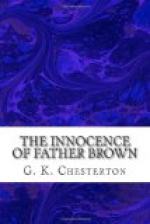“I beg your pardon,” said Father Brown; “that is my fault. I just sent him down the road to investigate something—that I just thought worth investigating.”
“Well, we want him back pretty soon,” said Angus abruptly, “for the wretched man upstairs has not only been murdered, but wiped out.”
“How?” asked the priest.
“Father,” said Flambeau, after a pause, “upon my soul I believe it is more in your department than mine. No friend or foe has entered the house, but Smythe is gone, as if stolen by the fairies. If that is not supernatural, I—”
As he spoke they were all checked by an unusual sight; the big blue policeman came round the corner of the crescent, running. He came straight up to Brown.
“You’re right, sir,” he panted, “they’ve just found poor Mr. Smythe’s body in the canal down below.”
Angus put his hand wildly to his head. “Did he run down and drown himself?” he asked.
“He never came down, I’ll swear,” said the constable, “and he wasn’t drowned either, for he died of a great stab over the heart.”
“And yet you saw no one enter?” said Flambeau in a grave voice.
“Let us walk down the road a little,” said the priest.
As they reached the other end of the crescent he observed abruptly, “Stupid of me! I forgot to ask the policeman something. I wonder if they found a light brown sack.”
“Why a light brown sack?” asked Angus, astonished.
“Because if it was any other coloured sack, the case must begin over again,” said Father Brown; “but if it was a light brown sack, why, the case is finished.”
“I am pleased to hear it,” said Angus with hearty irony. “It hasn’t begun, so far as I am concerned.”
“You must tell us all about it,” said Flambeau with a strange heavy simplicity, like a child.
Unconsciously they were walking with quickening steps down the long sweep of road on the other side of the high crescent, Father Brown leading briskly, though in silence. At last he said with an almost touching vagueness, “Well, I’m afraid you’ll think it so prosy. We always begin at the abstract end of things, and you can’t begin this story anywhere else.
“Have you ever noticed this—that people never answer what you say? They answer what you mean—or what they think you mean. Suppose one lady says to another in a country house, `Is anybody staying with you?’ the lady doesn’t answer `Yes; the butler, the three footmen, the parlourmaid, and so on,’ though the parlourmaid may be in the room, or the butler behind her chair. She says `There is nobody staying with us,’ meaning nobody of the sort you mean. But suppose a doctor inquiring into an epidemic asks, `Who is staying in the house?’ then the lady will remember the butler, the parlourmaid, and the rest. All language is used like that; you never get a question answered literally, even when you get it answered truly. When those four quite honest men said that no man had gone into the Mansions, they did not really mean that no man had gone into them. They meant no man whom they could suspect of being your man. A man did go into the house, and did come out of it, but they never noticed him.”




